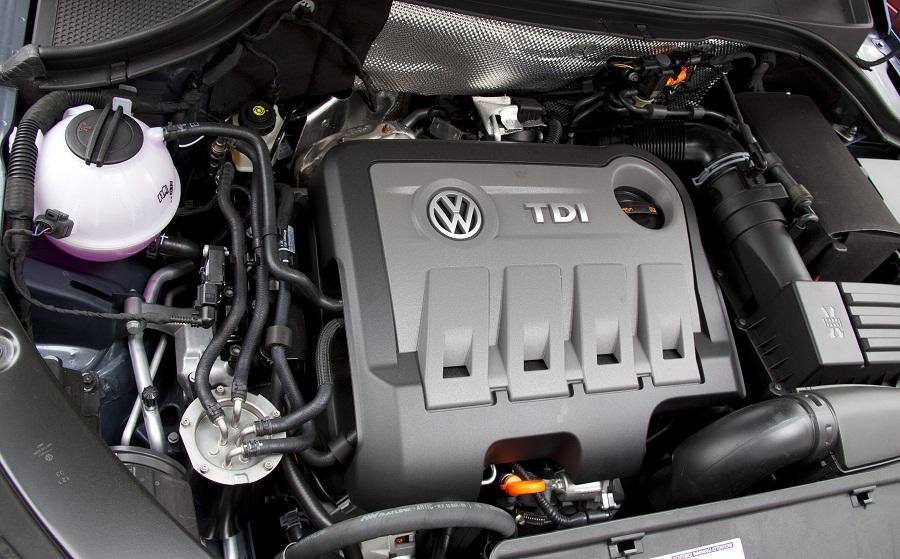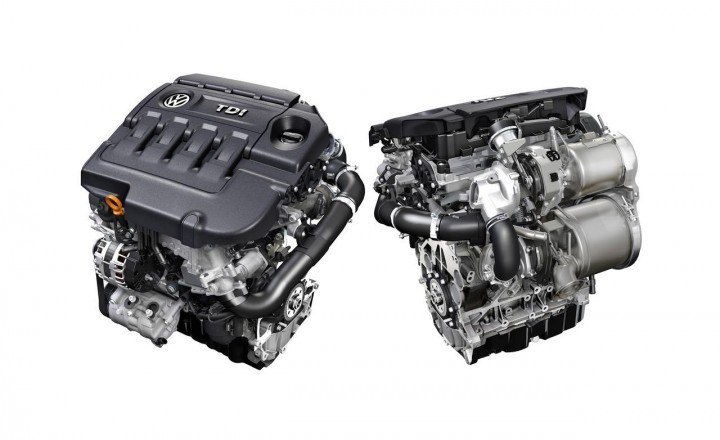
VW 2.0 TDI engine. Should I be afraid of this power unit? Advantages and disadvantages
Content
 TDI stands for Turbo Direct Injection and has been used by Volkswagen for many years. TDI units opened the era of engines in which fuel is injected directly into the combustion chamber. The first generation was installed on the Audi 100 model C3. The manufacturer equipped it with a turbocharger, an electronically controlled distributor pump and an eight-valve head, which meant that the design had a high operational and development potential.
TDI stands for Turbo Direct Injection and has been used by Volkswagen for many years. TDI units opened the era of engines in which fuel is injected directly into the combustion chamber. The first generation was installed on the Audi 100 model C3. The manufacturer equipped it with a turbocharger, an electronically controlled distributor pump and an eight-valve head, which meant that the design had a high operational and development potential.
VW 2.0 TDI engine. Legendary Durability
The Volkswagen Group was ambitious and efficient in developing the 1.9 TDI project, and over the years the engine received more and more modern equipment such as a variable exhaust geometry turbocharger, intercooler, pump injectors and a dual mass flywheel. Thanks to more and more modern technology, engine power has increased, work culture has improved and fuel consumption has decreased. The durability of 1.9 TDI power units is almost a legend, many cars with these engines can still drive to this day, and quite well. Often there is nothing to worry about in a run of the order of 500 kilometers. Modern designs can only envy such a result.
VW 2.0 TDI engine. Best the enemy of the good
The successor to the 1.9 TDI is the 2.0 TDI, which, according to some experts, is a perfect example of how the adage “perfect is the enemy of good” makes sense. This is because the first generations of these drives exhibited and still have much higher failure rates and higher operating costs. Mechanics claim that the 2.0 TDI was simply underdeveloped and the concern began to pursue a more aggressive policy of optimizing production costs. The truth probably lies in the middle. Problems arose from the very beginning, the manufacturer developed the next improvements and saved the situation. Hence such a large number of different solutions and components. When deciding to buy a car with a 2.0 TDI engine, you should be aware of this and check everything possible.
VW 2.0 TDI engine. Injector pump
The 2.0 TDI engines with a pump-injector system debuted in 2003 and were supposed to be as reliable as the 1.9 TDI, and of course more modern. Unfortunately, it turned out differently. The first engine of this design was placed under the hood of the Volkswagen Touran. The 2.0 TDI power unit was available in various power options, the eight-valve one produced from 136 to 140 hp, and the sixteen-valve one from 140 to 170 hp. The various variants differed mainly in accessories and the presence of a DPF filter. As already mentioned, the engine has been consistently upgraded and adapted to changing emission standards. The undoubted advantage of this motorcycle was low fuel consumption and good performance. Interestingly, the 2.0 TDI was used mainly in Volkswagen Group models, but not only. It can also be found in Mitsubishi cars (Outlander, Grandis or Lancer IX), as well as Chrysler and Dodge.
VW 2.0 TDI engine. Common Rail system
2007 brought even more modern technology to the Volkswagen Group using the Common Rail system and sixteen-valve heads. Engines of this design were distinguished by a more efficient work culture and were much more durable. In addition, the power range has increased, from 140 to 240 hp. Actuators are still produced today.
VW 2.0 TDI engine. Faults
As we have already mentioned, the described engine causes a lot of controversy among users, as well as people involved in car repair. This motor is undoubtedly the hero of more than one evening discussion, and this is due to the fact that its strength is economy in everyday use, and its weak point is its relatively low durability. A common problem with 2.0 TDI pump injectors is a problem with the oil pump drive, resulting in a sudden loss of lubrication, which in the worst case can lead to a complete seizure of the unit. The way out of this situation is to regularly inspect the faulty element and respond at the right time. These engines also struggle with the problem of cracking or "sticking" of the cylinder head. A characteristic symptom is the loss of coolant.
Pump injectors aren't the most durable either, and to make matters worse, Dumas wheels don't last long either. There were cases that they broke already at a run of 50 2008 kilometers. km. Users have also reported timing problems, most often due to worn hydraulic regulators. You have to add turbocharger failures, EGR valves and clogged DPF filters to the list. Engines made after XNUMX show slightly better durability.
The editors recommend: The most popular used cars for 10-20 thousand. zloty
Modern 2.0 TDI engines (common rail system) enjoy a good reputation among users. Experts confirm the opinion, but still urge to be careful. When buying a car with a newer engine, you should pay attention to the nozzles for which the manufacturer once conducted a service campaign. Hoses may be of defective material, which can lead to rupture. This problem mainly affects cars from 2009-2011, it is also recommended to check the oil pump regularly. As high mileage vehicles enter the market, problems with the particulate filter, EGR valve and turbocharger should be expected.
VW 2.0 TDI engine. Engine codes
As we have already mentioned, there are many variants of 2.0 TDI engines. Particular care should be taken when choosing a car that was produced before 2008. When checking this instance, you should pay attention first of all to the engine code. On the Internet, you will find accurate code catalogs and detailed information about which engines to avoid and which ones you might be interested in. The high-risk group is made up of engines with designations, for example: BVV, BVD, BVE, BHV, BMA, BKP, BMP. Slightly newer power units, such as AZV, BKD, BMM, BUY, BMN, are advanced designs that are theoretically capable of providing more peaceful operation, although it all depends on how the car was serviced.
In engines such as CFHC, CBEA, CBAB, CFFB, CBDB, CJAA with an electronically controlled direct fuel injection system, most of the problems have been eliminated and you can count on relative peace of mind.
VW 2.0 TDI engine. Repair cost
There is no shortage of spare parts for 2.0 TDI engines. There is demand and there is supply in the market. Volkswagen Group cars are very popular, which means that almost every car shop can organize the necessary spare part for us without any problems. All this makes the prices attractive, although you should always be interested in proven and better products.
Below we give approximate prices for spare parts for the 2.0 TDI engine fitted to the Audi A4 B8.
- EGR valve: PLN 350 gross;
- dual-mass wheel: PLN 2200 gross;
- glow plug: PLN 55 gross;
- injector: PLN 790 gross;
- oil filter: PLN 15 gross;
- air filter: PLN 35 gross;
- fuel filter: PLN 65 gross;
- timing kit: PLN 650 gross.
VW 2.0 TDI engine. Should I buy a 2.0 TDI?
Buying a car with a first generation 2.0 TDI engine is, unfortunately, a lottery, which means a big risk. After kilometers and years, some nodes have probably already been replaced by the previous owner, but this does not mean that malfunctions will not occur. We don't quite know what parts were used for the repair and who actually repaired the car. If you decide to buy, please double check the device code. The surest choice is a common rail engine, but this means you have to choose a newer car, which leads to a higher price. The most important thing is common sense and a thorough check by a specialist, sometimes it is worth choosing a gasoline engine, although here you also need to be careful, because the first TSI engines can also be capricious.
See also: What you need to know about the battery